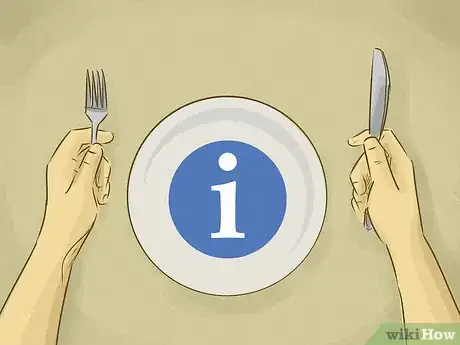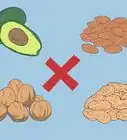This article was co-authored by Claudia Carberry, RD, MS. Claudia Carberry is a Registered Dietitian specializing in kidney transplants and counseling patients for weight loss at the University of Arkansas for Medical Sciences. She is a member of the Arkansas Academy of Nutrition and Dietetics. Claudia received her MS in Nutrition from the University of Tennessee Knoxville in 2010.
There are 9 references cited in this article, which can be found at the bottom of the page.
This article has been viewed 50,285 times.
Fasting is an important spiritual practice in many religions that emphasizes the purifying of one's body and mind. It is also used by many as a means of weight loss despite the lack of evidence showing effectiveness. However, if not implemented correctly and safely, it can be detrimental to your health. In order to avoid any negative side effects, you should plan for your fast in advance, alter your daily habits and make changes to your diet ahead of time. These preparations will make the fast a safer and more pleasant experience.
Steps
Arranging for the Fast
-
1Understand the requirements of a religious fast. Before you begin your faith-based fast, it is important to understand what the dietary and time requirements are. Many religious fasts have specific dietary guidelines and limitations on when you can eat. Know how long the fast will last and investigate its requirements. Depending on the fast, you may be allowed to consume certain foods or eat at specific times of the day.
- For example, during Ramadan, Muslims are required to fast from dawn until sunset.
- During Yom Kippur, Jews fast for nearly twenty-six hours.[1]
-
2Research the requirements of a dietary fast. There are many different types of fasts designed to help you lose weight and get healthy, which is not always true. If the fast sounds too good to be true, it probably is. These include various kinds of juice fasts, cleansing fasts and water fasts. Much like the religious fasts, these different dietary fasts have varying lengths of time and fasting requirements. Be sure to understand what is expected of your before you begin.[2]Advertisement
-
3Visit your doctor. Once you understand the requirements of your fast, you should visit your doctor to make sure that you are physically healthy enough to participate. A chronic or severe medical condition, such as diabetes or heart disease, may prevent you from fasting. You should also consult your doctor if you are pregnant or nursing and considering a fast.[3]
- Most faith-based fasts tend to have health related exemptions if you are unable to participate.
-
4Make any necessary work arrangements. Depending on the length and intensity of your fast, you may need to make special work arrangements. During the fast, you may get fatigued easily and require frequent rest. If the fast is going to last multiple days, you may want to inform your supervisor and coworkers that you are fasting and explain to them that the quality of your work may be impacted.
- If you work involves physical labor, you may need to take a leave during your fast.
-
5Plan your meals ahead of time. If you can consume certain foods or eat at certain times, you might want to consider meal planning for the fast ahead of time. Do any grocery shopping before the fast while you still have plenty of energy. If you run out of something, a trip to the grocery store may be a tortuous exercise while fasting.
- If you are participating in a juice fast, consider stocking up on the fruits and vegetables you will need before you begin.
- For example, if you are participating in the Ramadan fast, consider purchasing your supplies for Suhoor (the predawn meal) and Iftar (the after sunset meal) ahead of time.[4]
Changing Your Diet
-
1Drink lots of water. Before you begin your fast, make sure that you are drinking plenty of water. Getting enough water is not only necessary to maintain your health, but it can also help curb your appetite.[5] Men should drink about 13 cups (3 liters) and women should drink 9 cups (2.2 liters) a day.[6] Drinking enough water will help you curb your cravings and ease into your fast.
-
2Ease into the fast. In the days or weeks before the fast, try gradually easing your way into it. If the fast will last for a few weeks, consider adopting an eating schedule where you only eat on designated days of the week.[7] For shorter fasts, you may want to slowly cut back on how much you eat as you near the fasting period.[8] Either way, if you begin limiting how much you eat before the fast, it will be much easier to maintain it once you begin.
- Before you begin your fast, you should also stop snacking. This is also a good practice for controlling your hunger and it will help you practice restraint.
- Avoid eating a large meal before your fast. This will momentarily enlarge your stomach and increase your appetite as you begin your fast.[9]
-
3Eat healthy foods before fasting. As you near your fast date, consider eating more whole foods and skipping processed items, particularly sugary foods. Eating foods high in sugar can cause your blood sugar to crash, which increases your appetite. If you are looking to curb your appetite going into your fast, try to eat fruits, vegetables and whole grains. These foods will keep your appetite steady and make it easier for you to begin your fast.[10]
- You may also want to consider eating lean meats and other proteins. Protein rich foods will help you stay satiated longer.
- Avoid high-fat foods, which can also increase your hunger.
Altering Your Habits
-
1Regulate your sleep. Try to maintain a normal and healthy sleep schedule going into the fast. Sleep deprivation spurs hunger, which can make things problematic in the weeks before your fast when you are trying to limit how much you eat. If you can maintain a proper sleep schedule, you should have an easier time controlling your cravings going into your fast.[11]
- This is particularly important if you are fasting for Ramadan when your only opportunities to eat are early in the morning and late at night. Consider adjusting to these extreme meal times in advance.[12]
-
2Limit any addictive or habitual substances. Depending on your fast, you may have to give up certain substances for an extended period of time. Abstaining from certain addictive substances might cause you to experience withdrawals, which will it harder for you to maintain your fast. In order to prevent withdrawals, try to ween yourself off of these addictive substances in advance of the fast.[13]
- Some common addictive substances are caffeinated or sugary drinks, like coffee and soda, and tobacco products, like cigarettes and chewing tobacco.
-
3Take it easy. If you are easing your way into your fast, you may notice that you become fatigued more easily. Because you are limiting your caloric intake, your body is becoming more lethargic. During this period of low energy, you can easily overexert yourself and become ill or injured. In order to avoid these negative side-effects, be sure to relax and minimize any strenuous activity as you prepare for the fast.[14]
- Try to avoid any strenuous exercise routines or physical labor.
Warnings
- Keep in mind that fasting has not been proven to be effective as a weight loss tool and it can also have negative effects on your health.⧼thumbs_response⧽
References
- ↑ http://www.chabad.org/holidays/JewishNewYear/template_cdo/aid/177886/jewish/What-Is-Yom-Kippur.htm
- ↑ https://www.medicinenet.com/fasting_diets/article.htm
- ↑ with https://www.news-medical.net/health/A-Guide-to-Fasting-Healthily-for-Ramadan.aspx
- ↑ http://english.alarabiya.net/en/life-style/healthy-living/2015/06/13/Ready-for-Ramadan-Top-tips-to-prepare-your-body-for-fasting.html
- ↑ https://www.ncbi.nlm.nih.gov/pmc/articles/PMC4121911/
- ↑ https://health.clevelandclinic.org/how-much-water-do-you-need-daily/
- ↑ http://english.alarabiya.net/en/life-style/healthy-living/2015/06/13/Ready-for-Ramadan-Top-tips-to-prepare-your-body-for-fasting.html
- ↑ https://www.cru.org/train-and-grow/spiritual-growth/fasting/personal-guide-to-fasting.5.html
- ↑ https://www.chabad.org/holidays/JewishNewYear/template_cdo/aid/1638389/jewish/Tips-for-an-Easier-Fast.htm
- ↑ https://www.news-medical.net/health/A-Guide-to-Fasting-Healthily-for-Ramadan.aspx
- ↑ https://www.news-medical.net/health/A-Guide-to-Fasting-Healthily-for-Ramadan.aspx
- ↑ http://english.alarabiya.net/en/life-style/healthy-living/2015/06/13/Ready-for-Ramadan-Top-tips-to-prepare-your-body-for-fasting.html
- ↑ https://www.chabad.org/holidays/JewishNewYear/template_cdo/aid/1638389/jewish/Tips-for-an-Easier-Fast.htm
- ↑ https://www.news-medical.net/health/A-Guide-to-Fasting-Healthily-for-Ramadan.aspx
About This Article
You can prepare for your fast by drinking plenty of water, which will keep you hydrated and curb your food cravings as you get ready to stop eating. You should also start eating smaller meals in the days and weeks before your fast, since eating large meals will enlarge your stomach and only make you hungrier. Additionally, try to stop snacking as much as you can, which is a good way to practice restraint for your fast. Besides changing your diet, you should get plenty of sleep both before and during your fast to avoid excess hunger caused by sleep deprivation. Finally, make sure to avoid doing anything strenuous as you ease into your fast so you don’t hurt yourself or get sick. To learn how to meal prep for your fast, read more from our Medical co-author!


































































Medical Disclaimer
The content of this article is not intended to be a substitute for professional medical advice, examination, diagnosis, or treatment. You should always contact your doctor or other qualified healthcare professional before starting, changing, or stopping any kind of health treatment.
Read More...